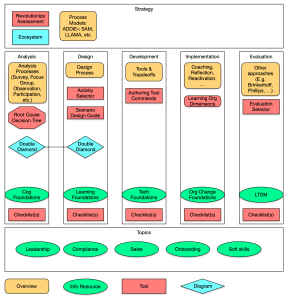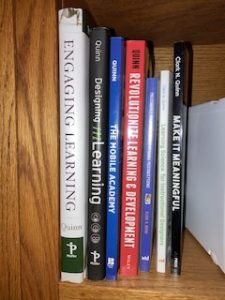This isn’t a rhetorical question. I truly do want to hear your thoughts on the necessary resources needed to successfully execute our L&D responsibilities. Note that by resources in this particular case, I’m not talking: courses, e.g. skill development, nor community. I’m specifically asking about the information resources, such as overviews, and in particular tools, we use to do our job. So I’m asking: what L&D resources do we need?
 I’m not going to ask this cold, of course. I’ve thought about it a bit myself, creating an initial framework (click on the image to see it larger). Ironically, considering my stance, it’s based around ADDIE. That’s because I believe the elements are right, just that it’s not a good basis for a design process. However, I do think we may need different tools for the stages of analysis, design, development, implementation, and evaluation, even if don’t invoke them in a waterfall process. I also have categories for overarching strategy, and for specific learning topics. These are spaces in which resources can reside.
I’m not going to ask this cold, of course. I’ve thought about it a bit myself, creating an initial framework (click on the image to see it larger). Ironically, considering my stance, it’s based around ADDIE. That’s because I believe the elements are right, just that it’s not a good basis for a design process. However, I do think we may need different tools for the stages of analysis, design, development, implementation, and evaluation, even if don’t invoke them in a waterfall process. I also have categories for overarching strategy, and for specific learning topics. These are spaces in which resources can reside.
There are also several different types of resources I’ve created categories for. One is an overview of the particular spaces I indicate above. Another are for information resources, that drill into a particular approach or more. These can be in any format: text or video typically. Because I’m weird for diagrams, I have them separately, but they’d likely be a type of info resource. Importantly, one is tools. Here I’m thinking performance support tools we use: templates, checklists, decision trees, lookup tables. These are the things I’m a bit focused on.
Of course, this is for evidence-based practices. There are plenty of extant frameworks that are convenient, and cited, but not well-grounded. I am looking for those tools you use to accomplish meaningful solutions to real problems that you trust. I’m looking for the ones you use. The ones that provide support for excellent execution. In addition to the things listed above, how about processes? Frameworks? Models? What enables you to be successful?
Obviously, but importantly, this isn”t done! That is, I put my first best thoughts out there, but I know that there’s much more. More will come to me (already has, I’ve already revised the diagram a couple of times), but I’m hoping more will come from you too. That includes the types of resources, spaces, as well as particular instances.
The goal is to think about the resources we have and use. I welcome you putting in, via comments on the blog or wherever you see this post, and let me know which ones you find to be essential to successful execution. I’d really like to know what L&D resources do we use. Please take a minute or two and weigh in with your top and essential tools. Thanks!

